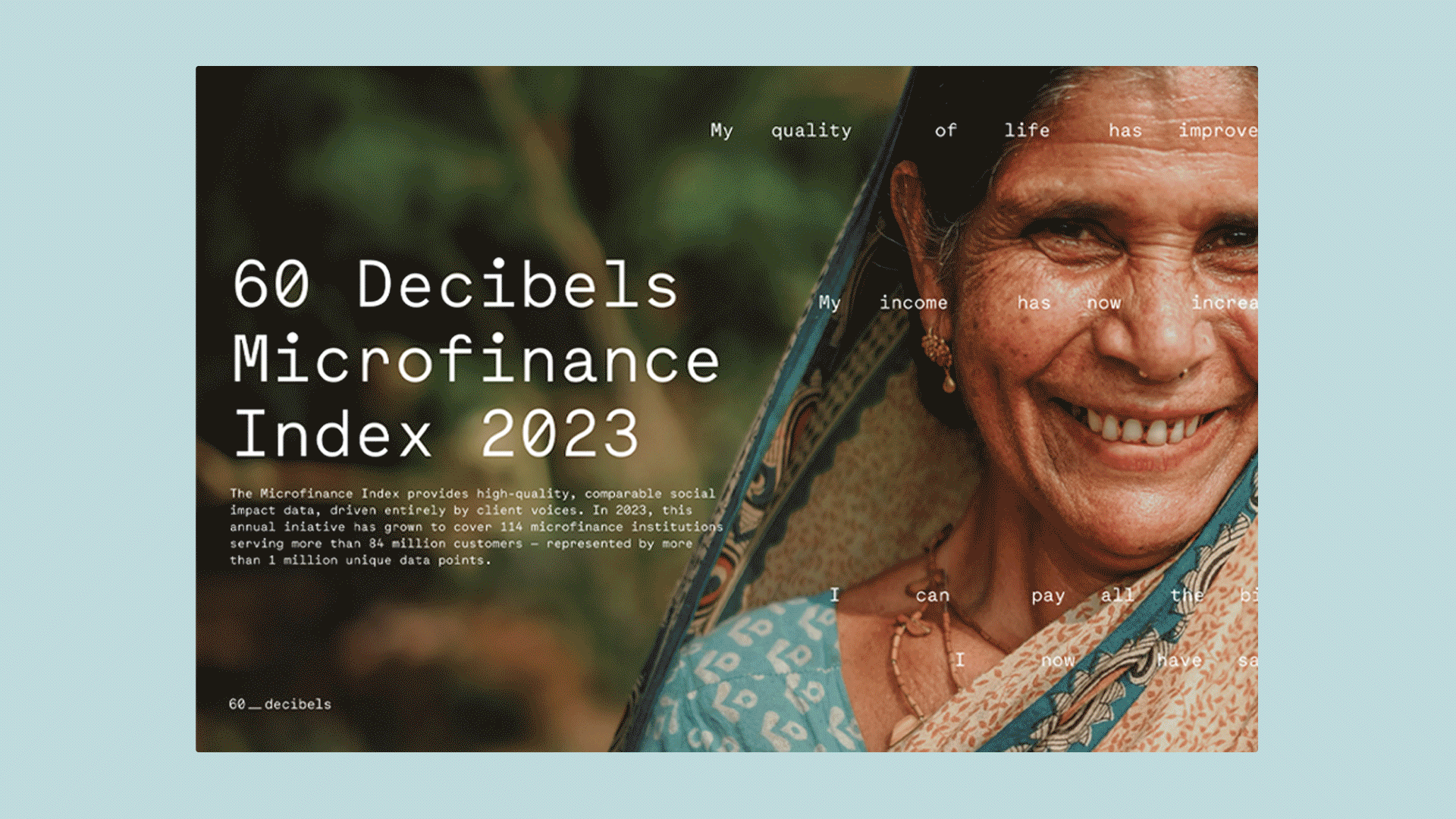
2023 Microfinance Index Report
The last decade has seen an explosion of new ‘inclusive finance’ companies offering financial services to low- and middle- income customers globally.
These microfinance institutions are often embedded in communities, and they have built deep relations of trust with their clients. They are uniquely positioned to increase financial resilience, help families withstand economic shocks, grow businesses, improve household well-being, and empower women.

Our belief—validated by our partnership with most of the world’s leading microfinance investors, networks, and institutions—is that the best way to answer these central questions is by listening, at scale, to microfinance clients.
We’ve done just that.
This year, 60 Decibels listened to more than 32,000 microfinance clients, bringing our complete Microfinance Index dataset from 2022 & 2023 to more than 50,000 clients globally—that’s more than 1 million unique data points. This is a massive dataset, rich with insights.
“My shop was made of bamboo previously. But now, I renovated my shop with concrete. I am happy that I can use the money effectively. I am happy.”
Female, 42
Top insights from the report
1. Longevity matters for deeper impact. Clients who have been with their FSP longer are more likely to say their lives and household welfare have ‘very much improved’.
We analyzed the difference between longer-tenure (>2 years) and shorter-tenure (<2 years) clients with respect to improvements in quality of life. 4 in 10 of longer-tenure clients report “significant improvements” compared to 3 in 10 of shorter-tenure clients.
2. Clients who access additional services from the FSP beyond their loan report stronger individual, business, and household outcomes.
We find that clients who access any services in addition to credit from the FSP in the last six months have more substantial improvements in quality of life, business income, ability to manage finances, savings, and confidence compared to those who do not.
3. Working with FSPs improves women’s ability to invest in their business, make decisions, achieve a financial goal, and increase their confidence.
83% of women report an improvement in their confidence, and 67% report an improvement in their ability to make independent financial decisions.
4. Clients with group loans report a significantly higher Net Promoter Score (NPS®) for their FSP relative to clients with individual loans. They also say they have a better understanding of loan terms and stronger financial resilience.
Group lending models are believed to foster a sense of community and support among clients. Our data show the group lending approach has advantages over individual lending, particularly in client satisfaction, loan terms and understanding, and financial resilience.
5. Clients report that they understand their loans and rarely experience unexpected fees. However, a significant percentage of clients say that their worry about finances has not decreased and that their loan repayments are a burden.
Though 9 in 10 clients we spoke to say they have never experienced an unexpected fee from their FSP, that does not fully translate to their financial security. Only 2 in 10 clients mention their time spent worrying about finances has very much decreased.
6. FSPs boost clients’ income and quality of life, but many clients remain financially vulnerable.
Despite a notable 88% of clients reporting improvements in their quality of life and 78% reporting increased income due to their FSPs, 30% still express concerns over their ability to address unforeseen emergency expenses.
Access the data behind the Microfinance Index
This year, you can dive into the data and insights behind the Index in 3 new paid tools: an aggregate, interactive dashboard; geographic snapshot reports; or bespoke, portfolio-level insights. If you’re looking for microfinance data on a specific theme or region, or want to learn more, get in touch!
